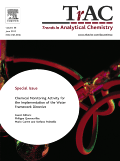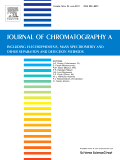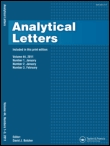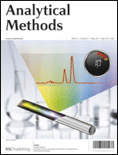
TRAC-TRENDS IN ANALYTICAL CHEMISTRY
metrics 2024
Exploring the Frontiers of Analytical Innovation
Introduction
TRAC - Trends in Analytical Chemistry is a prestigious journal published by Elsevier Science Ltd, situated in the Netherlands. With an impressive impact factor reflected in its Q1 rankings across three major categories—Analytical Chemistry, Environmental Chemistry, and Spectroscopy—this journal stands at the forefront of disseminating pioneering research and advancements in the field of analytical chemistry. Established in 1981, TRAC provides a comprehensive platform for researchers to share influential studies and insights related to the latest trends, methodologies, and technologies in analytical techniques. Recognized globally, the journal excels in fostering cross-disciplinary dialogue and innovation, making it an indispensable resource for academics, professionals, and students alike. Explore the latest issues to stay abreast of cutting-edge developments that shape the analytical sciences.
Metrics 2024
 2.11
2.11 11.80
11.80 12.70
12.70 214
214Metrics History
Rank 2024
Scopus
IF (Web Of Science)
JCI (Web Of Science)
Quartile History
Similar Journals

CHINESE JOURNAL OF ANALYTICAL CHEMISTRY
Empowering Research through Analytical InsightsCHINESE JOURNAL OF ANALYTICAL CHEMISTRY, published by SCIENCE PRESS in China, stands as a prominent platform in the field of analytical chemistry since its inception in 1989. With its ISSN 0253-3820 and E-ISSN 1872-2040, the journal maintains a vital role in disseminating empirical research and innovative methodologies, contributing to the advancement of analytical techniques and their applications. The 2023 Scopus ranking positions the journal in the third quartile (Q3) within its category, reflecting a respectable standing among its peers. Researchers, professionals, and students alike engage with a broad range of topics, from instrumental analysis to environmental monitoring, each aiming to foster further scientific inquiry. Although it does not currently offer Open Access, the journal's rich repository of knowledge continues to be an essential resource for those in the analytical chemistry community, with an enduring commitment to scientific excellence and collaboration.

ANALYTICAL AND BIOANALYTICAL CHEMISTRY
Unveiling the Complexities of Chemical AnalysisANALYTICAL AND BIOANALYTICAL CHEMISTRY, published by SPRINGER HEIDELBERG, is a leading international journal that serves as a vital platform for innovative research in the fields of analytical and bioanalytical chemistry. With an impressive impact factor and ranking in the Q2 category for both Analytical Chemistry and Biochemistry, the journal highlights key advancements and methodologies that drive the discipline forward. Established in 1996 and continuing vigorously into 2024, it has gained significant recognition with Scopus rankings placing it in the 83rd and 78th percentiles within its categories, underscoring its impact and relevance. The journal's commitment to open access facilitates widespread dissemination of critical scientific knowledge, making it an essential resource for researchers, professionals, and students dedicated to exploring the complexities of chemical analysis. With its base in Heidelberg, Germany, ANALYTICAL AND BIOANALYTICAL CHEMISTRY continues to inspire and influence the global research community.

TALANTA
Catalyzing Progress in the World of Chemical AnalysisTALANTA, published by Elsevier, is a premier international journal that serves as a vital platform in the field of analytical chemistry. Since its inception in 1958, TALANTA has provided a comprehensive forum for the dissemination of groundbreaking research and developments in chemical analysis, spanning a wide array of topics including biochemistry and spectroscopy. With an impressive impact factor and ranking in the Q1 quartile within its category for 2023, it is ranked #12 out of 156 journals in Analytical Chemistry by Scopus, placing it among the most influential journals in its field. Researchers, professionals, and students benefit from its stringent peer-review process and high-quality content that drives advancements in analytical methodologies and applications. TALANTA's commitment to fostering innovation and excellence in research makes it an indispensable resource for anyone at the forefront of scientific inquiry.

Analytical and Bioanalytical Chemistry Research
Bridging Disciplines in Analytical and Bioanalytical Chemistry.Analytical and Bioanalytical Chemistry Research is an esteemed open-access journal published by the Iranian Chemical Society, dedicated to the advancement of knowledge in the fields of analytical chemistry, biochemistry, and spectroscopy. Since its inception in 2014, this journal has provided a platform for researchers, professionals, and students to publish and access high-quality research articles that contribute to the understanding of chemical analysis and bioanalytical methods. With an ISSN of 2383-093X and an open-access model that promotes global dissemination of findings, it ensures that innovative research reaches a broad audience. The journal has consolidated its presence in the scientific community, currently ranked in quartile Q4 for analytical chemistry, biochemistry, and spectroscopy as of 2023. Its Scopus rankings, including a percentile of 34th in Analytical Chemistry, reflect its commitment to quality research and scholarly contribution. Situated in Tehran, Iran, the journal serves as a vital resource for academic discourse, offering insights into emerging trends and methodologies in analytical and bioanalytical chemistry.

JOURNAL OF CHROMATOGRAPHY A
Unveiling Breakthroughs in BiochemistryJOURNAL OF CHROMATOGRAPHY A, published by Elsevier, is a leading journal in the disciplines of Analytical Chemistry, Biochemistry, and Organic Chemistry, boasting an impressive 2023 Q2 categorization across multiple fields. With an ISSN of 0021-9673 and an E-ISSN of 1873-3778, this prestigious journal has been at the forefront of chromatography research since its inception in 1958. The journal serves as a vital platform for disseminating high-quality research articles, reviews, and insights into the latest developments in chromatographic techniques and applications, reflecting its standing in the top tier of analytical and organic chemistry literature, evidenced by its impressive Scopus rankings. While it currently operates under a subscription model, the journal continues to make significant contributions to the scientific community by fostering collaboration and innovation in chromatography methodologies. We invite researchers, professionals, and students to engage with the essential findings shared within its pages, which are foundational for advancements in various scientific fields, making it an indispensable resource for enhancing chromatographic knowledge and practice.

Biosensors-Basel
Empowering research through open access in biosensors.Biosensors-Basel is a premier Open Access journal, published by MDPI since 2011, dedicated to advancing the field of biosensors and related technologies. With its academic headquarters in Basel, Switzerland, the journal serves as a vital resource for researchers, professionals, and students across various disciplines, including Analytical Chemistry, Biomedical Engineering, Biotechnology, and Clinical Biochemistry. Boasting an impressive range of quartile rankings—such as Q1 in Instrumentation and Q2 across several other categories—Biosensors-Basel is recognized for its high-impact research and significant contributions to the scientific community, evidenced by Scopus rankings that place it among the top journals in its field. The journal's open-access model ensures that cutting-edge findings are accessible to a global audience, promoting collaboration and innovation in biosensor technology and its applications. Scholars and professionals looking to stay on the forefront of this dynamic field will find Biosensors-Basel an indispensable platform for sharing knowledge and fostering advancements.

Pakistan Journal of Analytical & Environmental Chemistry
Connecting Global Minds in Chemistry and EnvironmentPakistan Journal of Analytical & Environmental Chemistry, published by the University of Sindh, National Centre of Excellence Analytical Chemistry, is a distinguished platform that has been committed to promoting high-quality research in the fields of analytical and environmental chemistry since its inception. With an ISSN of 1996-918X and an E-ISSN of 2221-5255, this journal has established itself as an open-access resource since 2007, facilitating the dissemination of knowledge to a global audience. Acknowledged for its contributions, the journal currently holds a Q4 category ranking in both Analytical Chemistry and Environmental Chemistry as of 2023, with Scopus rankings placing it within the challenging competitive bracket. The journal aims to publish original research, reviews, and technical notes that elucidate contemporary challenges and advancements, making it an essential read for researchers, professionals, and students who are exploring innovative methodologies and solutions in chemical analysis and environmental monitoring. By fostering a collaborative research environment and encouraging multidisciplinary approaches, the Pakistan Journal of Analytical & Environmental Chemistry plays a crucial role in advancing the field and addressing environmental concerns in Pakistan and beyond.

ANALYTICAL LETTERS
Pioneering Discoveries in Analytical MethodologiesANALYTICAL LETTERS is a reputable journal published by Taylor & Francis Inc, focusing on the dynamic fields of analytical chemistry, biochemistry, and clinical biochemistry. With an ISSN of 0003-2719 and an E-ISSN of 1532-236X, the journal has been a platform for scholarly articles since its inception in 1967, and is set to continue its contribution to the scientific community until 2024. Despite its classification in Q3 across various categories as of 2023, including analytical chemistry and spectroscopy, ANALYTICAL LETTERS maintains a significant impact within its field, evidenced by its moderate rankings within Scopus. This journal serves as a vital resource for researchers and professionals seeking to explore recent advancements in analytical methodologies, instrumentation, and applications, facilitating the dissemination of critical insights in laboratory practices. With access primarily through institutional subscriptions, it remains positioned as a crucial tool for those advancing knowledge and innovation in analytical sciences.

Analytical Methods
Pioneering Research in Analytical TechniquesAnalytical Methods, published by the renowned Royal Society of Chemistry, is a distinguished journal that has been serving the scientific community since its inception in 2009. Specializing in the fields of Analytical Chemistry, Chemical Engineering, and General Engineering, this journal holds a reputable position with an impressive Q2 ranking in three relevant categories as of 2023. With its focus on innovative methodologies and advanced applications in analytical science, it aims to disseminate cutting-edge research and foster dialogue among researchers, professionals, and students. Although it is not an open access publication, it is accessible worldwide and provides critical insights into the latest developments in analytical techniques and their engineering applications. The journal also ranks highly in pertinent Scopus categories, such as being in the 77th percentile for General Engineering and 61st percentile for Analytical Chemistry, underlining its significance in advancing knowledge and practical applications in these fields. By participating in this journal, readers can expect to engage with high-quality research that influences the future of analytical practices and chemical engineering.

Brazilian Journal of Analytical Chemistry
Catalyzing Collaboration in Analytical ChemistryBrazilian Journal of Analytical Chemistry, published by VISAO FOKKA COMMUNICATION AGENCY, serves as a vital platform for those engaged in the field of analytical chemistry, especially within the Latin American context. With an ISSN of 2179-3425 and an E-ISSN of 2179-3433, this journal aims to promote high-quality research and advancements in analytical methodologies, instrumentation, and applications spanning from 2010 to the present. Although it currently holds a Q4 rank in Analytical Chemistry by Scopus and is placed at the 24th percentile, its commitment to open access publishing provides invaluable opportunities for widespread dissemination of knowledge, catering to researchers, professionals, and students alike. The journal's editorial board comprises emerging and established experts aiming to bridge gaps in analytical chemistry research, particularly in a Brazilian and broader South American context. Situated in São Paulo, Brazil, the journal's role in fostering innovation and collaboration in analytical techniques makes it an essential resource for the academic community.